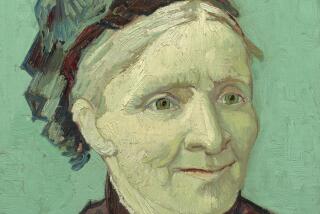Love, Marriage and the Bargains That Go Unkept
- Share via
N ews item: Apparently distraught that her ex-husband was going to the Super Bowl without her, the former wife of San Diego Chargers quarterbacks coach Dwain Painter killed herself hours after the AFC championship game.
And then the story got worse.
When Diane Painter’s two children attempted to scatter her ashes into the sea off the craggy coast of Mendocino 10 days ago, they were pulled into the roiling waters by a huge wave. Her son, battered and bleeding, climbed to safety. Her daughter drowned, leaving an 18-month-old son.
Of course, Diane Painter’s name was never mentioned in the leads of the news stories because it was her ex-husband, the football coach, who was the point of reference.
Natives of Pennsylvania and high school sweethearts, the Painters had been married for 30 years, divorced for three. They had moved to New Jersey, California, Utah, Arizona, Georgia, Texas, Illinois and back to Pennsylvania as Dwain Painter pursued his dream, which was, as the news reports say, to coach a team that would play in the Super Bowl.
Diane Painter, 52, died on Jan. 15, after her ex-husband’s team pulled off its upset of the Pittsburgh Steelers. For the first time ever, the Chargers would be competing in the Super Bowl.
After the game, according to her father, Harry Pugsley, Diane Painter called her mother and said, “I’m the one who should be going to the Super Bowl, not his girlfriend.”
And then, according to the Allegheny County police, she walked into her garage in suburban Pittsburgh and started her car. Her death was attributed to carbon monoxide poisoning.
Said her father to a reporter: “I feel it’s the game that did it. She felt through all those years she should have gone to the Super Bowl. It killed her.”
And then, of course, the story got much worse.
*
The image of a young woman seized by the waves as she honored her mother continues to haunt. What was she thinking as the sea pulled her to her death? Of her mother, divorced, depressed and dying alone? Of her own life, which would be different? Of her 18-month-old son waiting at home?
The deaths of Diane Painter and Debbie Menta are profound ones, for they raise all sorts of dark and unanswerable questions about chains of events, tragedy, guilt and blame.
If nothing else, they serve as a reminder that contemporary life can rival anything found in the great tragedies of fiction.
The particulars of their lives may never be known to or understood by those outside the families involved.
But for the rest of us, horrified and haunted by the news stories, something resonates, something about women who hitch their happiness to their men, something about bargains that go unkept, something about the bitterness felt by women who, as Diane Painter’s own father put it, “could never let go.”
Such women are not unfamiliar. You read about them from time to time. Some, like Betty Broderick--who killed her ex-husband and his new wife--have so much anger it spews in toxic waves, destroying others as they destroy themselves. Others take a more ladylike approach, turning their anger and resentment inward, ending up depressed, bereft, sitting in a garage filled with carbon monoxide.
Is there a lesson, some untarnishable nugget, buried somewhere in all this pain?
*
Perhaps it is overly simplistic, but I take from these events the conviction that women need their own passions--passions that exist apart from husbands and children, passions that fulfill and endure. Child-rearing is critical, important and seriously underrated work, but it is work, finally, that is temporary. Inevitably, the nestlings take wing.
Men (and surely some resent this) are expected to find their fulfillment outside the home, in their work, in their play. Women nowadays can have it both ways--who raises an eyebrow if she decides to stay home to raise the children? Who objects if she decides to return to work?
Sometimes I fear for my friends who have chosen the traditional role, the ones who have given up outside work to stay home. These are the ones whose identities are at risk should the marriages somehow unravel.
I imagine--perhaps unfairly, but probably not given the comments of Diane Painter’s father--that just as Dwain Painter was the point of reference in the news stories about his ex-wife’s death, that for 30 years, he was the point of reference for her, and that she had sacrificed something--probably quite a lot--to accommodate his professional dream.
There is nothing unseemly about her having done that; nothing unseemly about him having wanted her to. It’s the bargain married couples have made forever, the phenomenon Virginia Woolf referred to when she wrote in “A Room of One’s Own” that, “Women have served all these centuries as looking glasses, possessing the magic and delicious power of reflecting the figure of man at twice its natural size.”
What Woolf does not say, and only implies, is what we may infer from Diane Painter’s suicide: That sometimes, on the other side of the looking glass is the figure of a woman, shrunk by half.
More to Read
Go beyond the scoreboard
Get the latest on L.A.'s teams in the daily Sports Report newsletter.
You may occasionally receive promotional content from the Los Angeles Times.











